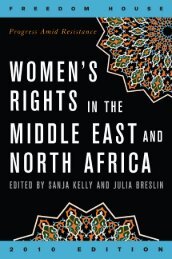Women and Politics in the Third World
Women and Politics in the Third World
Women and Politics in the Third World
Create successful ePaper yourself
Turn your PDF publications into a flip-book with our unique Google optimized e-Paper software.
WOMEN AND THE STATE IN THE THIRD WORLD 31<br />
state, an emerg<strong>in</strong>g techno-managerial system pursu<strong>in</strong>g non-secular policies,<br />
<strong>and</strong> at <strong>the</strong> <strong>in</strong>ternational level be<strong>in</strong>g <strong>in</strong>dependent <strong>and</strong> dependent at <strong>the</strong> same<br />
time…[<strong>in</strong>dicate <strong>the</strong> complexity of its] state process.<br />
(Mohanty 1990: 151)<br />
While traditional elites were be<strong>in</strong>g co-opted <strong>in</strong>to <strong>the</strong> new state networks, with<br />
<strong>the</strong> ‘weakness’ of <strong>the</strong> post-colonial state towards <strong>the</strong>se elites ensur<strong>in</strong>g political<br />
stability, tensions also emerged from <strong>the</strong> clash of expectations released by <strong>the</strong><br />
rhetoric of change <strong>and</strong> <strong>the</strong> reality of compromise. One of <strong>the</strong>se tensions has<br />
emerged from <strong>the</strong> clash of <strong>the</strong> rhetoric of gender equality <strong>and</strong> <strong>the</strong> reality of a<br />
patriarchal political power system. ‘Weak’ state, without adequate <strong>in</strong>frastructural<br />
power, could only look to <strong>the</strong> exercise of ‘despotic power’ which fur<strong>the</strong>r put<br />
back <strong>the</strong> goal of rapid, focused economic development. What we have <strong>the</strong>n <strong>in</strong><br />
most countries of <strong>the</strong> <strong>Third</strong> world is a complex state situation.<br />
While it is clear from <strong>the</strong> above discussion that some of <strong>the</strong> Western fem<strong>in</strong>ist<br />
debates do not take <strong>in</strong>to account <strong>the</strong> different types of state formation, it is also<br />
obvious that much of <strong>the</strong> literature on <strong>the</strong> developmental <strong>and</strong> postcolonial state is<br />
at best gender-bl<strong>in</strong>d (see Elson 1992). A serious problem with <strong>the</strong> developmental<br />
model of state formation—<strong>the</strong> dist<strong>in</strong>ction between ‘strong’ <strong>and</strong> ‘weak’ state—is<br />
that it does not allow for an uncover<strong>in</strong>g of <strong>the</strong> patriarchal power that is an<br />
essential part of both types of states. So, for example, it cannot expla<strong>in</strong> <strong>the</strong><br />
compromise of a ‘strong’ state like <strong>the</strong> People’s Republic of Ch<strong>in</strong>a with<br />
patriarchal forces <strong>in</strong> <strong>the</strong> <strong>in</strong>terests of political stability <strong>and</strong> economic growth (see<br />
Evans 1992; Rai 1992). There is, however, a grow<strong>in</strong>g literature by <strong>Third</strong> <strong>World</strong><br />
fem<strong>in</strong>ists challeng<strong>in</strong>g both <strong>the</strong>se perspectives.<br />
<strong>Third</strong> <strong>World</strong> fem<strong>in</strong>ist perspectives<br />
In <strong>the</strong> writ<strong>in</strong>gs of <strong>Third</strong> <strong>World</strong> fem<strong>in</strong>ists, however, we f<strong>in</strong>d a different approach<br />
to <strong>the</strong> question of <strong>the</strong> state. The state (especially <strong>the</strong> post-colonial state) is<br />
regarded as of critical importance <strong>in</strong> women’s lives both public <strong>and</strong> private.<br />
Mernissi (1991), for example, even speaks of <strong>the</strong> ‘fem<strong>in</strong>isation’ of <strong>the</strong> male <strong>in</strong> <strong>the</strong><br />
post-colonial state (her own be<strong>in</strong>g Morocco) as <strong>the</strong> traditional role of <strong>the</strong> economic<br />
provider is no longer <strong>the</strong> exclusive concern of <strong>the</strong> man <strong>in</strong> <strong>the</strong> family, <strong>and</strong> as <strong>the</strong><br />
modernis<strong>in</strong>g state draws women <strong>in</strong>to <strong>the</strong> public arena through both law <strong>and</strong><br />
public provision such as education. Similarly, <strong>in</strong> India we f<strong>in</strong>d a considerable<br />
emphasis placed upon <strong>the</strong> power (or lack) of <strong>the</strong> state to formulate men <strong>and</strong><br />
women (see e.g. Kapur <strong>and</strong> Cossman 1993). Many women’s groups have, for<br />
example, been <strong>in</strong>volved <strong>in</strong> <strong>the</strong> draw<strong>in</strong>g up of <strong>the</strong> National Perspective Plan for<br />
<strong>Women</strong> 1988–2000 (M<strong>in</strong>istry of Human Resource Development 1988)<br />
‘recommends certa<strong>in</strong> special <strong>in</strong>terventions for women as transitory measures to<br />
ensure that <strong>the</strong>y catch up with <strong>the</strong> ma<strong>in</strong>stream by 2000 A.D.’ (ibid.: ii). There is<br />
thus an implicit sett<strong>in</strong>g up of a b<strong>in</strong>ary opposition between <strong>the</strong> state <strong>and</strong> patriarchal<br />
forces <strong>in</strong> society (Mehdid 1993: 9).




